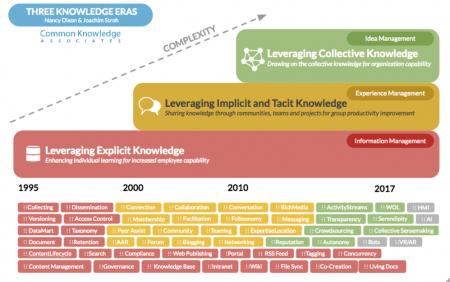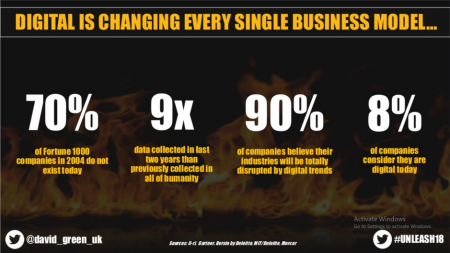...
How would you like to be a Guest Blogger for KMI? Email us at: info@kminstitute.org and let us know your topic(s)!
Why Knowledge Management's Time is Now
Officially started back in 1995, Knowledge Management (KM) has had a bumpy ride to put it kindly. There are a number of reasons for this, the most significant one being that it was at its inception owned and delivered by IT (not KM specialists) and was largely dependent on databases with impenetrable folder structures. This meant that adoption of KM was poor and it nearly always failed to live up to its hype – the right information to the right people at the right time. The problem was further exacerbated by the fact that an IT driven approach essentially focused on explicit knowledge which has always represented at best merely 20% of the company knowledge; the remaining 80% being in the heads of employees.
And so KM soldiered on for the next quarter of a century getting as much bad press as good press (see: the famous Nancy Dixon timeline graphic below). The problem being that the promise of KM was just too good to ditch but the practice of KM was proving too difficult to deliver.

Now fast forward to today where the perfect storm in terms of technology advancement and societal change has made the need for KM more important than ever. Indeed, there is now an unquestionable Knowledge imperative for business, that is impossible for any sane thinking CEO to ignore. The need for better KM really is a very easy sell today.
Consider this slide from People Analytics curator David Green:

Simply put, the future of your company lies in the heads of a vast ecosystem made up of your employees, your partners and your customers. Without a well-designed and executed KM program with dedicated resources in place, you are playing Russian roulette with the future of your company and sooner or later it will almost certainly become collateral damage.
Call this time in history what you like – the Digital Age, the Age of exponential Change, Age of Disruption, Age of Anxiety, Generation Z - one thing is clear companies are disappearing at speed -- Kodak, Nokia (for mobile phones), Woolworths, Blockbuster, Borders. Society is changing at speed – drones, self-driving cars, 3D printing, and robotics. Business is changing at speed – Uber, Air B&B, Google cars. The workplace and the worker is changing – automation, the gig economy, virtual reality.
So developing a KM practice as a means of helping your company to stay in the game is now a priority.
When asked what their top 3 Digital Workplace Priorities were, KM was number 2 (source: The State of Digital Workplace report, CMS Wire 2020)

However the ability to execute KM well and to make it both agile and sustainable remains a challenge. Interestingly that challenge is no longer really to do with technology (we have the tools and the appetite to collaborate at speed: social media continues to prove that beyond any doubt).
The problem remains one of culture and change. And this is why a well-designed KM program that is funded and resourced as a business priority is the hallmark of companies that truly understand the knowledge imperative and are actively seeking to use KM to improve the odds that their business and their employees have a future.
They know that Knowledge Management’s time is now!
 About the Author:
About the Author:
A veteran of the dot-com era, Rooven Pakkiri is a digital evangelist who focuses on the way technology changes organisational communication and collaboration. He is an author and regular speaker on the subject of Social Business and how it is transforming the corporate rule book. Rooven is also the co-founder of a regular thought leadership event in London where independent thinkers discuss issues of user adoption and cultural transformation. As an independent consultant, Rooven is responsible for developing client specific adoption strategies and immersion programs. As part of this process Rooven employs a number of techniques from scenario modeling, content seeding, champion identification and community development. Rooven teaches KM Institute's CKM class and the CKS in Social KM-Collaboration and Communities.
Archives
- June 2016 (3)
- May 2016 (2)
- April 2016 (2)
- February 2016 (1)
- January 2016 (4)
- December 2015 (1)
- October 2015 (2)
- September 2015 (4)
- August 2015 (2)
- July 2015 (2)













